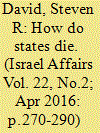|
|
|
Sort Order |
|
|
|
Items / Page
|
|
|
|
|
|
|
| Srl | Item |
| 1 |
ID:
179355


|
|
|
|
|
| Summary/Abstract |
The events of 1978 shaped much of Viet Nam's political and economic environment for more than a decade. After the triumph of the war for national independence in 1975, Viet Nam hoped for a new era of sustained peace and economic development. However, soon after, in 1978, Viet Nam found itself bogged down in another war against the Khmer Rouge to the West, defending against a surprise Chinese invasion to the North and bearing the brunt of economic sanctions from the U.S. and allies. Viet Nam's sole lifeline was economic and military aid from the Soviet bloc. Economic and political isolation crippled the country's economy and continued until Viet Nam launched comprehensive reforms in 1986 and withdrew from Cambodia in 1989. Given the critical importance of the events in 1978 and their consequences, this piece aims to review the happenings, their causes and lessons learned for contemporary diplomacy, particularly for small-to-medium sized countries.
|
|
|
|
|
|
|
|
|
|
|
|
|
|
|
|
| 2 |
ID:
144671


|
|
|
|
|
| Summary/Abstract |
Israel is one of the only countries whose continued existence is called into question. The history of state death and particularly the record of state death since the end of the Cold War provide insights into the kinds of threats that are most likely to bring about the demise of countries in the twenty-first century, including Israel. This record suggests that armed conquest is no longer a principal danger to countries. Instead, state death is more likely to arise by a peaceful decision to end the state. The reasons for this decision vary case by case, but changes in the policy of a great power, ethnic strife, and a growing belief in the illegitimacy of the country’s right to exist have all played key roles in recent state deaths. Israel struggles with each of these issues, making the lessons of state death especially relevant for its future. By learning from the experience of state deaths, Israel can best assess its own vulnerabilities and determine what it needs to do to maximize its prospects for survival.
|
|
|
|
|
|
|
|
|
|
|
|
|
|
|
|
| 3 |
ID:
181537


|
|
|
|
|
| Summary/Abstract |
Divided societies have long been seen as terrible terrain for democracy. Yet some countries in South and Southeast Asia have managed to overcome ethnic and religious rifts and establish lasting democracy, as in India, while other countries in these regions have seen such deep divisions underpin durable authoritarianism, as in Malaysia. We trace these differences to divergent definitions of the nation that prevailed in struggles for independence and that continue to provide a political resource in ongoing political struggles. Where the national community was defined as inclusive in both ethnoreligious and popular terms, democracy has proven stronger. Alternatively, where the foundational national bargain was more exclusive with respect to salient identity cleavages and popular classes, authoritarianism has been reinforced. Founding types of nationalism not only help explain regime types in India and Malaysia but in countries across southern Asia, offering novel insight into how to understand ongoing battles to shape the nation and the people’s political position within it. In an era of rising nationalist fervor and eroding support for democracy, understanding the conditions under which nationalism either promotes democracy or bolsters authoritarianism is of critical importance to political scientists, activists, and policymakers alike.
|
|
|
|
|
|
|
|
|
|
|
|
|
|
|
|
|
|
|
|
|